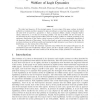Free Online Productivity Tools
i2Speak
i2Symbol
i2OCR
iTex2Img
iWeb2Print
iWeb2Shot
i2Type
iPdf2Split
iPdf2Merge
i2Bopomofo
i2Arabic
i2Style
i2Image
i2PDF
iLatex2Rtf
Sci2ools
115
click to vote
CORR
2010
Springer
2010
Springer
Mixing Time and Stationary Expected Social Welfare of Logit Dynamics
We study logit dynamics [3] for strategic games. At every stage of the game a player is selected uniformly at random and she is assumed to play according to a noisy best-response dynamics where the noise level is tuned by a parameter . Such a dynamics defines a family of ergodic Markov chains, indexed by , over the set of strategy profiles. Our aim is twofold: On the one hand, we are interested in the expected social welfare when the strategy profiles are random according to the stationary distribution of the Markov chain, because we believe it gives a meaningful description of the long-term behavior of the system. On the other hand, we want to estimate how long it takes, for a system starting at an arbitrary profile and running the logit dynamics, to get close to the stationary distribution; i.e., the mixing time of the chain. In this paper we study the stationary expected social welfare for the 3-player CK game [5], for coordination and anti-coordination 2-player games, and for a si...
| Added | 09 Dec 2010 |
| Updated | 09 Dec 2010 |
| Type | Journal |
| Year | 2010 |
| Where | CORR |
| Authors | Vincenzo Auletta, Diodato Ferraioli, Francesco Pasquale, Giuseppe Persiano |
Comments (0)

